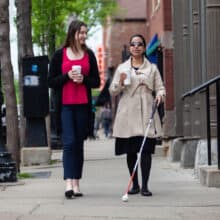
Call Centers Aim To Decrease Unemployment Rate Among Those with Disabilities
Several organizations and companies throughout the United States are working to decrease the unemployment rate among people with disabilities by providing jobs. In an effort to meet this goal, the Chicago Lighthouse has contracts with several call centers, including the Illinois Tollway, Advocate Health, the Illinois Department of Professional and Financial Regulations (IDFPR) and UI Health. All four call centers combined employ over 500 individuals.
The call centers employ people who are blind, visually impaired, multi disabled or veterans. Thanks to assistive technology such as screen reading or magnifying software and simple adaptations like adjustable desks and chairs, employees can carry out all of the job tasks. These include answering callers’ questions, updating electronic information and scheduling appointments.
Kimberly Duhart has been a call center agent since 2013. She was one of the first employees at the Illinois Tollway call center, which is housed at the University of Illinois Chicago campus. Thanks to her Department of Rehabilitation (DRS) Councilor, she found out about the Jobs Galore Fair, held by the Chicago Lighthouse in conjunction with the Mayor’s Office for People With Disabilities.
Although she had previously been employed, personal factors had kept Duhart out of the workforce for some time. After going to the job fair, Duhart applied online and was hired. She currently works for the UI Health call center, located at the Chicago Lighthouse’s main facility on 1850 West Roosevelt Road.
While her previous employers were very understanding and accommodating, Duhart often encountered skepticism from others. She felt rushed during interviews by prospective employers as soon as they realized she had a physical disability. Duhart believes that this skepticism may be because employers might be afraid of having to adjust to working with people with disabilities.
Kathy Stoeberl, Vice President of Call Center Enterprises at the Chicago Lighthouse believes that rather than being skeptical about job applicants with disabilities, employers should have an open mind and be willing to find ways to best accommodate them. While she had heard about the Lighthouse, Kathy was unfamiliar with the scope of programs and services offered by the organization. Working with visually impaired and disabled employees has allowed her to learn more about assistive technology and how this can help them be as productive and efficient as everyone else.
Stoeberl says that the aspect that strikes her the most is the effort and loyalty of her staff. One example that stands out is the time when there was a particularly bad snowstorm, and many of her sighted employees couldn’t make it to work. Fearing that there would not be enough employees, Kathy considered closing some of the centers that day. When she arrived, however, she realized that most of the employees who were there were those with disabilities.
“Because they’re used to taking a bus or a train and figuring out how to get here when the weather’s bad… we were able to then keep the call centers open, which obviously made the clients happy,” she says.
Another aspect that amazes Stoeberl is the intelligence and memory of her visually impaired and disabled employees. She is constantly amazed by how well these individuals learn and memorize the various rules and procedures involved in the call centers.
“We’re very proud of them,” she says.
Both Duhart and Stoeberl think that prospective employers should be more willing to learn from and accommodate disabled employees.
“Give that person a chance to prove that they qualify for the position, and don’t judge them based on their appearance,” Duhart says.
Stoeberl hopes that one day more employers will believe in the potential of visually impaired and disabled employees.
“I hope that we can reach as many people as we can to help them understand that [visually impaired and disabled individuals] are the most loyal employees we have.”







